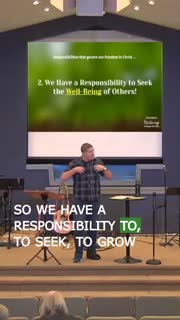Embracing Freedom: Responsibilities in Christ
Devotional
Sermon Summary
Bible Study Guide
Sermon Clips
1. "Friends, the same is true also with our freedom in Christ, okay? In Christ, we have great freedom. We have been forgiven. If you've trusted Christ as your Savior, okay, and you are a believer, what that means is that you believe that Jesus's sacrifice on the cross, that God's offer of his son as a sacrifice for your sins applies to you. And what the scripture tells us then is that God has forgiven us and separated our sins as far as the east is from the west. So all of our sins are forgiven. All of our past, all of our present sins, all of our future sins are forgiven. So friends, there is a real freedom in Christ." [03:39] (50 seconds)
2. "So we should lean into that. Amen? We talk about walking by grace and leaning into God's grace. That's what that means. It means that not that now I've got to be perfect, but that when I sin, praise God for his grace. Praise God that that grace is already paid for it. Okay? So there is real freedom from sin. There's real freedom from the law in Christ. Now, I know what maybe some of you are thinking, well, pastor, there's freedom from the law, but there's still rules we have to follow, right? There are still, see, this is the thing, okay? Paul is very specific about it. He says, why then do you, if we are under grace, do we then come and put ourselves back under the law? He says, you're negating grace if you're putting yourself back under the law." [05:14] (51 seconds)
3. "Friends, first of all, we have a responsibility to seek to grow spiritually, okay? And we don't have a responsibility to go and sin any way we want to, okay? Paul starts out here in verse 23 with a phrase that I believe and many commentators believe had kind of become a slogan in Corinth, okay? They leaned into God's grace awful heavily, okay? And so Paul has said this before. He said it back in chapter six. And so this first phrase here, all things are lawful for me or all things are permissible for me. He says it here. He's already said it in chapter six. And so it's believed that this was kind of a slogan. That those who, for some of the Corinthians who took their freedom to say, we can do whatever we want to do, they leaned into this slogan. All things are permissible for me. All things are lawful for me, okay? And so Paul didn't want to say, Paul didn't want to disagree with him because technically that's true, okay? Technically it's true. However, there are some responsibilities that go along with that." [06:56] (71 seconds)
4. "So something may be, something may be legal. Something may be permissible for us to do, but it is not helpful or beneficial to us or others, then should we do it? No, okay? So the first part is, he says, all things are lawful, but all things are not helpful. The second part of verse 23, he says this, all things are lawful for me, but not all things edify. The word edify simply means build up. It's the Greek word okadomeo. It speaks originally of building a house, okay? So if you take that concept of building a house, and he's really talking about though our lives, he says, all things are not, not all things edify or not all things are helpful. So he says, not all things build up. He's not talking about a physical house. He's talking about our lives. We sing a song about that sometimes, about building our lives on Christ, okay? And so he's speaking metaphorically here of our spiritual growth." [08:27] (63 seconds)
5. "So we have a responsibility to, to seek, to grow spiritually ourselves and, and how our, how our actions affect that. And, and, but we also have a responsibility of how our actions affect other people. Look at verse 24. And as I said, verse 23, already, we've talked about this hints at that a little bit. Does it build others up? Does it, is it helpful for others? But in verse 24, he says this, let no one seek his own, but each one, excuse me, the other's wellbeing. So this reminds us of Philippians, right? Consider others better than yourself. Okay. So Paul, wants them to know, wants us to realize, listen, in the decisions we make, in the choices we make, don't just think about yourself. Isn't that kind of what our country or our world today, our society tells us to do? Our society very rarely tells us to think of others. Our society says, do what's best for you. Look out for number one, put you first. Okay. But scripture turns that on its head. And as Paul says, don't let no one seek his own, but each one, the other's wellbeing." [18:58] (73 seconds)
6. "So friends, we need to be careful, right? Are there things that come out of your mouth, offend others, and cause them? Because here's what I want you to notice, okay? There's a specific purpose Paul has in mind here. Look at verse 33. He says, just as I also please all men in all things, okay? Now, Paul's not saying here, telling us to be a people pleaser, okay? But here's what he is saying. He says, just as I please all men in all things, not seeking my own profit, the profit of many that they may be saved. So Paul's reason to not give offense is for what purpose? That they may be saved. That you won't offend somebody else and cut them off from ever listening to the gospel. Friends, are there things that come out of your mouth that offend somebody that they may never, ever, ever would listen to the gospel coming from you?" [39:54] (71 seconds)
7. "Friends, bringing glory to the Lord, bringing glory to God ought to be our number one ambition in all we do. Does this, this decision, this choice, this direction of what I'm doing, does it bring glory and honor to God or does it not? And listen, I know this morning I've kind of posited it like, either you bring glory to God or you bring shame to God. But guess what? There's also just kind of a neutral ground. And sometimes we think, well, as long as I'm neutral, it's okay. And listen, I know some decisions and things we do are neutral. Okay. But friends, as we grow in our walk with Christ, friends, bringing glory to God ought to be our main goal. That everything we do, listen, sometimes our decisions are not between bad and good, but they're between okay and what's best. And how can I bring glory to God? In a situation, you know, as we talk about these different responsibilities, this is the one that that is overarching over all the others. Okay. And that's kind of what Paul is saying here is if you can't do this, you can't listen, do it to bring glory to Jesus. Do it to bring glory to God. Whatever you will, it bring glory to the King of Kings and the Lord of Lords." [37:50] (82 seconds)
8. "Friends, if we turn somebody off from not just hearing us, but maybe from the gospel, I don't want to have nothing to do with them Jesus spouting people. Listen, for some of the stuff I read, if I wasn't a believer, I wouldn't want to either. The things that ought to come from us is kindness and gentleness and a demeanor of which is, yes, friends, when appropriate and when we get our opportunity to speak the truth in love. Don't ever not speak the truth in love. But we also need to show a kindness and a gentleness that, like Jesus, draws people and not pushes them away. Paul wants, with these verses, I believe, for our lives, for us, not to be about ourselves, not to be about our opinions, our agenda. Listen, some people are so, waiting for an opportunity to get their opinion out there, they just want to spout it. It doesn't matter what people think about it. Beware of that, friends. Paul's agenda is and says our agenda should be to please all men and not seek my own profit, but the profit of many that they may be saved." [41:49] (89 seconds)
9. "Friends, before you offend someone, before you let your judgmentalness come out, before you be judgmental, remember how God has been patient with you. Remember how good Jesus has been to you. Amen? Friends, yes, you are free to do what you want to do in many, many of those areas that the Bible doesn't speak specifically about. But if you're free to say what you want to say about those things, friends, but will it lead to spiritual growth? Will it be for the well-being of others? Will it bring glory to God and to the Lord Jesus Christ? And will it lead people to him?" [45:24] (47 seconds)
10. "Friends, we need to remember, nothing in our lives, number one, is as important as Jesus. Amen? And second, nothing in your life, friends, will be more important than what you do for him and the responsibility that you have as his child. Here's what I want to encourage you to do. First of all, I want you to lean into his grace. Hadn't talked about that since the beginning, have we? I want you to lean into his grace. Friends, God is such a grace-filled God. He's forgiven us through what is, he provided the sacrifice for our sins to be able to forgive us all of our sin. And we have freedom in Christ. Christ because of that. So lean into that. Don't not lean into that. Don't feel guilty for leaning into that. You know, every day when you mess up, guess what? You tell the devil, ha, Jesus died for me. Lean into it. That's what it means to lean into God's grace. But friends, not only do I want you to lean into God's grace, I also want you to lean into the responsibility Jesus has called us to. Lean into the responsibility to grow in him. Lean into the responsibility to put others before you. Lean into the responsibility to glorify him in everything you do. And lean into the responsibility to seek to win others to Christ. Friends, if we'll do that and do this, we'll be right where we need to be." [48:52] (99 seconds)
Ask a question about this sermon
2. "So we should lean into that. Amen? We talk about walking by grace and leaning into God's grace. That's what that means. It means that not that now I've got to be perfect, but that when I sin, praise God for his grace. Praise God that that grace is already paid for it. Okay? So there is real freedom from sin. There's real freedom from the law in Christ. Now, I know what maybe some of you are thinking, well, pastor, there's freedom from the law, but there's still rules we have to follow, right? There are still, see, this is the thing, okay? Paul is very specific about it. He says, why then do you, if we are under grace, do we then come and put ourselves back under the law? He says, you're negating grace if you're putting yourself back under the law." [05:14] (51 seconds)
3. "Friends, first of all, we have a responsibility to seek to grow spiritually, okay? And we don't have a responsibility to go and sin any way we want to, okay? Paul starts out here in verse 23 with a phrase that I believe and many commentators believe had kind of become a slogan in Corinth, okay? They leaned into God's grace awful heavily, okay? And so Paul has said this before. He said it back in chapter six. And so this first phrase here, all things are lawful for me or all things are permissible for me. He says it here. He's already said it in chapter six. And so it's believed that this was kind of a slogan. That those who, for some of the Corinthians who took their freedom to say, we can do whatever we want to do, they leaned into this slogan. All things are permissible for me. All things are lawful for me, okay? And so Paul didn't want to say, Paul didn't want to disagree with him because technically that's true, okay? Technically it's true. However, there are some responsibilities that go along with that." [06:56] (71 seconds)
4. "So something may be, something may be legal. Something may be permissible for us to do, but it is not helpful or beneficial to us or others, then should we do it? No, okay? So the first part is, he says, all things are lawful, but all things are not helpful. The second part of verse 23, he says this, all things are lawful for me, but not all things edify. The word edify simply means build up. It's the Greek word okadomeo. It speaks originally of building a house, okay? So if you take that concept of building a house, and he's really talking about though our lives, he says, all things are not, not all things edify or not all things are helpful. So he says, not all things build up. He's not talking about a physical house. He's talking about our lives. We sing a song about that sometimes, about building our lives on Christ, okay? And so he's speaking metaphorically here of our spiritual growth." [08:27] (63 seconds)
5. "So we have a responsibility to, to seek, to grow spiritually ourselves and, and how our, how our actions affect that. And, and, but we also have a responsibility of how our actions affect other people. Look at verse 24. And as I said, verse 23, already, we've talked about this hints at that a little bit. Does it build others up? Does it, is it helpful for others? But in verse 24, he says this, let no one seek his own, but each one, excuse me, the other's wellbeing. So this reminds us of Philippians, right? Consider others better than yourself. Okay. So Paul, wants them to know, wants us to realize, listen, in the decisions we make, in the choices we make, don't just think about yourself. Isn't that kind of what our country or our world today, our society tells us to do? Our society very rarely tells us to think of others. Our society says, do what's best for you. Look out for number one, put you first. Okay. But scripture turns that on its head. And as Paul says, don't let no one seek his own, but each one, the other's wellbeing." [18:58] (73 seconds)
6. "So friends, we need to be careful, right? Are there things that come out of your mouth, offend others, and cause them? Because here's what I want you to notice, okay? There's a specific purpose Paul has in mind here. Look at verse 33. He says, just as I also please all men in all things, okay? Now, Paul's not saying here, telling us to be a people pleaser, okay? But here's what he is saying. He says, just as I please all men in all things, not seeking my own profit, the profit of many that they may be saved. So Paul's reason to not give offense is for what purpose? That they may be saved. That you won't offend somebody else and cut them off from ever listening to the gospel. Friends, are there things that come out of your mouth that offend somebody that they may never, ever, ever would listen to the gospel coming from you?" [39:54] (71 seconds)
7. "Friends, bringing glory to the Lord, bringing glory to God ought to be our number one ambition in all we do. Does this, this decision, this choice, this direction of what I'm doing, does it bring glory and honor to God or does it not? And listen, I know this morning I've kind of posited it like, either you bring glory to God or you bring shame to God. But guess what? There's also just kind of a neutral ground. And sometimes we think, well, as long as I'm neutral, it's okay. And listen, I know some decisions and things we do are neutral. Okay. But friends, as we grow in our walk with Christ, friends, bringing glory to God ought to be our main goal. That everything we do, listen, sometimes our decisions are not between bad and good, but they're between okay and what's best. And how can I bring glory to God? In a situation, you know, as we talk about these different responsibilities, this is the one that that is overarching over all the others. Okay. And that's kind of what Paul is saying here is if you can't do this, you can't listen, do it to bring glory to Jesus. Do it to bring glory to God. Whatever you will, it bring glory to the King of Kings and the Lord of Lords." [37:50] (82 seconds)
8. "Friends, if we turn somebody off from not just hearing us, but maybe from the gospel, I don't want to have nothing to do with them Jesus spouting people. Listen, for some of the stuff I read, if I wasn't a believer, I wouldn't want to either. The things that ought to come from us is kindness and gentleness and a demeanor of which is, yes, friends, when appropriate and when we get our opportunity to speak the truth in love. Don't ever not speak the truth in love. But we also need to show a kindness and a gentleness that, like Jesus, draws people and not pushes them away. Paul wants, with these verses, I believe, for our lives, for us, not to be about ourselves, not to be about our opinions, our agenda. Listen, some people are so, waiting for an opportunity to get their opinion out there, they just want to spout it. It doesn't matter what people think about it. Beware of that, friends. Paul's agenda is and says our agenda should be to please all men and not seek my own profit, but the profit of many that they may be saved." [41:49] (89 seconds)
9. "Friends, before you offend someone, before you let your judgmentalness come out, before you be judgmental, remember how God has been patient with you. Remember how good Jesus has been to you. Amen? Friends, yes, you are free to do what you want to do in many, many of those areas that the Bible doesn't speak specifically about. But if you're free to say what you want to say about those things, friends, but will it lead to spiritual growth? Will it be for the well-being of others? Will it bring glory to God and to the Lord Jesus Christ? And will it lead people to him?" [45:24] (47 seconds)
10. "Friends, we need to remember, nothing in our lives, number one, is as important as Jesus. Amen? And second, nothing in your life, friends, will be more important than what you do for him and the responsibility that you have as his child. Here's what I want to encourage you to do. First of all, I want you to lean into his grace. Hadn't talked about that since the beginning, have we? I want you to lean into his grace. Friends, God is such a grace-filled God. He's forgiven us through what is, he provided the sacrifice for our sins to be able to forgive us all of our sin. And we have freedom in Christ. Christ because of that. So lean into that. Don't not lean into that. Don't feel guilty for leaning into that. You know, every day when you mess up, guess what? You tell the devil, ha, Jesus died for me. Lean into it. That's what it means to lean into God's grace. But friends, not only do I want you to lean into God's grace, I also want you to lean into the responsibility Jesus has called us to. Lean into the responsibility to grow in him. Lean into the responsibility to put others before you. Lean into the responsibility to glorify him in everything you do. And lean into the responsibility to seek to win others to Christ. Friends, if we'll do that and do this, we'll be right where we need to be." [48:52] (99 seconds)










